Members
 Paolo Di Nardo, MD
Paolo Di Nardo, MD
Paolo Di Nardo, after his degree in Medicine
and Cardiology, expanded his knowledge in basic and applied sciences in
different Italian and foreign laboratories. At present, he holds teaching
appointments at the Medical School and at the Department of Biology of the
University of Rome Tor Vergata. Furthermore, he is Vice-Head of the
Cardio-respiratory Clinic of the same University. Scientific advisor of major
international organizations and member of international scientific societies,
he has founded the Laboratory of Cellular and Molecular Cardiology and is
Scientific Director of the Centre of Space Bio-Medicine of the University of
Rome Tor Vergata. He has also founded the Japanese-Italian Tissue Engineering
Laboratory (JITEL) at the Tokyo Women’s Medical University and the
Canadian-Italian Tissue Engineering Laboratory (CITEL) at Winnipeg (Manitoba).
Co-founder of the Italian Society of Cardiovascular Research and of the
(Italian) National Institute for Cardiovascular Research. Member of
international scientific societies, he is author of several papers published in
peer-reviewed international scientific journals. Among others, in 1994, he
organized the first international Congress in which the possibility of heart
regeneration in mammalians has been analyzed. Since then, his major interests
have been in cardiac pathophysiology, myocardial effects of omega-3 fatty
acids, and stem cell and tissue engineering technology.
 Marilena Minieri, PhD
Marilena Minieri, PhD
Marilena Minieri got with honours a master degree
in Biology at the University of Rome La Sapienza (1984). Since 1985, she
collaborates with Dr. Paolo Di Nardo at LCMC, University of Rome Tor Vergata.
In 1993 she defended her PhD thesis in Cardiovascular Pathophysiology.
At present, she is Assistant Professor at the
Department of Experimental Medicine and Surgery, University of Rome Tor
Vergata. She is Member of the Faculty of the PhD Program in Materials for
Environment and Energy at the University of Rome Tor Vergata. Finally, she has
some clinical activity at the Laboratory Medicine Department, Tor Vergata
University Hospital.
Her scientific interests have been mainly
focused on the definition of the cardiomyopathic phenotype, the effects of
nutritional factors on gene expression, the role of stem cells in cardiac
pathophysiology, and tissue engineering. She is author of several papers on
international scientific journals.
 Felicia Carotenuto, PhD
Felicia Carotenuto, PhD
Felicia Carotenuto received with honors her master degrees in Biological Sciences and, then, in Natural Sciences from the University of Naples “Federico II”. Subsequently, she got her PhD in Experimental Pathophysiology from the University of Rome “Tor Vergata”. She has now a postdoctoral position. The scientific interest of Dr. Carotenuto has been mainly focused on cardiovascular and muscle diseases, the role of stem cells in cardiac pathophysiology and regenerative medicine and the effect of nutritional factors on cell mechanisms. She is author of several papers on international peer-reviewed scientific journals.
 Francesca Pagliari, PhD
Francesca Pagliari, PhD
Francesca Pagliari graduated with honors in
Molecular Biology at the University of Rome “Tor Vergata”. After graduation,
she investigated the stem cell role in cardiac regeneration and got a PhD
degree in Materials for Environment and Energy under the supervision of Prof.
P. Di Nardo. She is currently a postdoctoral fellow at the Physical Science and
Engineering Division, King Abdullah University of Science and Technology
(KAUST), Jeddah, Saudi Arabia. Her interests are mainly focused on the study of
the interactions between different natural/synthetic biomaterials and adult
stem cell in terms of attachment, growth and differentiation, and their
potential use in cardiac tissue engineering applications. An additional focus
relies on the nanotechnology approaches to regulate stem cell fate. In this
field, she investigates the CeO2 effects on cardiac progenitor and
bone marrow mesenchymal cell behavior by using a multidisciplinary approach
that combines biophysical, biochemical and imaging techniques.
She also works on the development of new cell
seeding methods on 3D scaffolds and their culture in bioreactor systems. She is
author of several articles published in peer-reviewed scientific journals.
 Manuele Gori, PhD
Manuele Gori, PhD
Manuele Gori got with honours his master
degree (2004) in Biological Sciences and his PhD (2008) in Sciences and
Biotechnologies of Reproduction and Development at the University of Rome Tor
Vergata. From 2008 to 2010, he was a Postdoctoral Fellow at the University of
California Irvine (UCI), conducting research on germline and pluripotent stem
cell biology in the Peter Donovan’s lab. In 2010, Dr. Gori got a Postdoctoral
position in Prof. Paolo Di Nardo’s lab at the University of Rome Tor Vergata,
performing research on cardiac tissue engineering. From 2011 to 2013, he was
Postdoctoral Fellow at the Balsano Foundation in Rome. He has published
scientific research papers and review articles in the field of stem cell and
molecular biology in international peer-reviewed journals. Dr. Gori’s main
scientific interests focus on pluripotent stem cells, tissue engineering and
regenerative medicine.
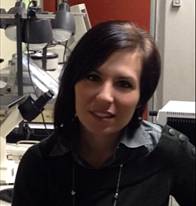 Giorgia Nardone, PhD
Giorgia Nardone, PhD
Giorgia Nardone got with honors a Master
degree in Biological Sciences at the University of Rome “Roma Tre”. After
graduation, she joined the Department of Science and Chemical Technologies,
University of Rome “Tor Vergata”, to pursue her Ph.D. degree in Materials for Environment and Energy
under the supervision of Prof. Di Nardo. She has published several papers on
peer-reviewed journals.
Her main research interest is the isolation,
purification and characterization of human stem cells residing into the
myocardium (hCPCs) to be used to fabricate myocardial
proto-tissues. In particular, her research is focused on the in vitro biological comparison of
electrospun scaffolds with distinct structural composition in order to
investigate their ability to support Sca-1pos hCPC growth. Recently,
she also started to study the interaction between hCPCs and Bombix mori silk fibroin scaffolds.
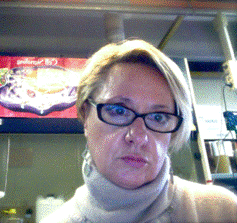 Anna Maria Maccari, Graduate Fellow
Anna Maria Maccari, Graduate Fellow
Graduated with honors in Biological Sciences at the University of Rome La Sapienza,
where she specialized in Health Statistics. She has worked at
The University of Rome La Sapienza and, then, at Tor Vergata in a
team of cardiologists interested in the pathophysiology of cardiac diseases and
the assessment of innovative diagnostic methods. Subsequently,
she was enrolled to contribute to design protocols to study families affected by
hereditary cardiomyopathies in a National Reserach Council Program. In this ontext,
she developed new skills as molecular biologist to run mutational analysis of genes
encoding for sarcomeric proteins. She also
applied molecular biology techniques to study gene polimorphisms (SNPs) in
patients affected by immunologic or chronic disease. More recently, she
collaborated
with LCMC in implementing research projects aimed at discovering new factors and
intracellular pathways in engineered cardiac tissues.
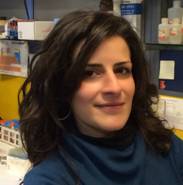 Giovanna Lopreiato Graduate student in Human Biology and Evolution
Giovanna Lopreiato Graduate student in Human Biology and Evolution
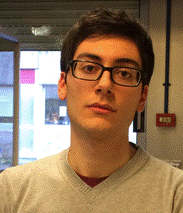 Angelo Onorato Graduate student in Medicine
Angelo Onorato Graduate student in Medicine
Associate Members
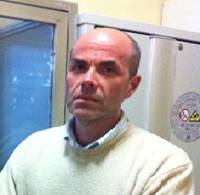 Giovanni Monego, MD
Giovanni Monego, MD
Giovanni Monego got his MD (1996) and
Specialization degree in Obstetrics and Gynecology at the Università Cattolica
del S. Cuore, Roma. After two years in the Army Medical Corp, he got a PhD
degree in Morphological and Molecular Sciences at the Università Cattolica del
S. Cuore, Roma. Since 2006, he is Assistant Professor at the Dept. of Human
Anatomy and Cell Biology, Università Cattolica del S. Cuore, Roma. He teaches Human
Anatomy in undergraduate and postgraduate courses at the same University. His
major research interests are in morphological/functional studies of molecular
signaling in tissue exposed to ischemic damage or pathological stress. He is
author of several papers published on peer-reviewed international scientific
journals.
giovanni.monego@rm.unicatt.it
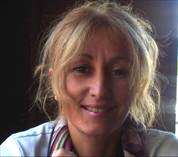 Sonia Melino, Ph.D – Senior Researcher
Sonia Melino, Ph.D – Senior Researcher
Sonia Melino got
with honours the Master
Degree in Biological Sciences/Biochemistry, University of Rome “La
Sapienza” Italy (1992).
Subsequently, she got with honours the Specialization Degree in
Biotechnology (1995) at the
University of Rome “Tor Vergata” and the PhD in Biochemistry and
Molecular Genetics (2000) at the
University of Chieti G. D’Annunzio. At present, she is Assistant Professor/Senior
Researcher in Biochemistry at the Department of Sciences and Chemical
Technologies and Member of the Centre for Biostatistics and Bioinformatics,
University of Rome “Tor Vergata”. She has several teaching appointments and is
Member of the Faculty of the Ph.D Program in “Molecular and Cellular Biology”,
University of Rome “Tor Vergata”. Her research interest is focused on the
structural and functional characterization of proteins and metal-peptides, and
the identification of the “consensus motifs” in order to clarifying their
physiological role and mechanism of action. In particular, she is investigating
the effects of the Organ Sulfur Compounds (as the H2S releasing
agents) on pluripotent and cancer cells, and their potential use in the fabrication
of novel hydrogel scaffolds. She is author of several papers published on
international peer-reviewed journals and member of the Editorial Board of Molecular & Cellular Oncology.
e-mail: melinos@uniroma2.it
tel. +39 06 7259 4449